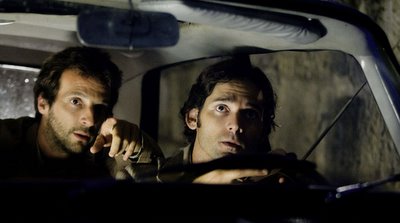
Robert Fulford, one of the more consistently cogent and readable columnists at the National Post, writes today that Steven Spielberg’s Munich is not only based on the dubious evidence offered by an anonymous source in George Jonas’s book Vengeance, but it is also a “banal” movie that “has further diluted the ‘facts’ with gallons of basic Hollywood soup stock, swamping whatever hunks of truth were available.”
There is merit to some of Fulford’s criticisms; however, others are themselves at variance with the facts, such as they are. For example — and, warning, there be spoilers here — Fulford writes:
Spielberg and his scriptwriters, Tony Kushner and Eric Roth, freely invent scenes or characters whenever the alleged facts don’t make sufficient impact. They add a beautiful woman spy who leads an Israeli to his death and insert a ludicrous passage in which the Israelis and some Palestinian terrorists get double-booked in the same “safe house” hotel room. This provides a painfully obvious excuse for a Palestinian to articulate his political position.
Actually, both of these episodes are based on episodes in Jonas’s book, and thus, however much Spielberg or Kushner or Roth may have tweaked or revised these episodes, they cannot be accused of “adding” or “inserting” them into the story.
In the original 1984 edition of Vengeance, the “beautiful woman spy” with the very recognizable perfume first appears on page 260. The Israeli’s dead body is found on page 264. And the woman is killed on her houseboat in Holland on page 277. Where the film deviates from the book — and from most of Spielberg’s other films, for that matter — is in its gratuitous emphasis on the nudity of the dead man and the nudity of the dead woman; in the book, the Israeli is found under a blanket, while the woman is merely “starting to expose her cleavage” when the men shoot her. (“It was hard to tell whether the gesture was conscious or involuntary,” the book adds.)
As for the episode with the Palestinians in the “safe house”, it seems to be based on this paragraph from page 199:
They arrived in Athens on April 11 — a Wednesday — to find the safe house in which they spent that first night filled with Arab terrorists. Believing Avner and his companions to be from the Red Army Faction of the German underground, the Arabs talked freely in front of them, not only because of their presumed ideological affinity but also because they did not expect the German comrades to understand Arabic. The topic was the recent Israeli raid in Beirut, and the Arabs seemed gratifyingly afraid as they talked about lying low in Cairo or Baghdad for the time being. Though Avner had no doubts about the efficacy of counter-terrorism, the way the Arabs were talking helped reinforce his conviction that his team was doing the right thing. Thanks partly to their efforts, the mechablim were on the run.
In fairness to Fulford, there may or may not be something “ludicrous” in the way that Spielberg handles this episode — and Spielberg has certainly pushed this episode in the exact opposite thematic direction, by making the Palestinian terrorist bold and assertive rather than “gratifyingly afraid” — but the fact remains, the basic episode itself does go back to Jonas’s book.
Fulford goes on to write:
As for ordinary credibility: I believed hardly any of Spielberg’s film. I didn’t believe, for instance, that Israeli intelligence would choose a junior agent as team-leader and then burden the poor young guy with a nerdy bomb specialist whose incompetence leads to disaster. (If you believe Spielberg, idiots were running Mossad in those days.)
Well, this part of the story does conform more-or-less to Jonas’s account, so if it is unbelievable in the film, it is probably unbelievable in the book, too. Though I suppose it’s possible Fulford’s complaint has more to do with the casting and nuancing of the characters rather than the fact that the characters were young, per se.
Nor did I believe that the fledgling leader, Avner (played by a rather sullen Eric Bana), would kill half a dozen people and only then demand that his boss show him proof that they were really the bad guys.
This, admittedly, does feel out of place in the film — it echoes the sorts of concerns we have heard lately about civil-rights violations committed in the name of national security, but it does not echo the experience or perspective of the real-life “Avner”, who told Jonas he has “no qualms” about anything his team did (page 347) and re-asserted this point recently in a foreword to a new edition of the book.
I don’t think I could go as far as Fulford does, by condemning Spielberg for his “coarse, indifferent exploitation of tragedy”; while Spielberg may be ambivalent to the point of paralysis on many of the issues raised by his film, I think “indifference” is the last thing to which this film testifies. But I do agree that the film’s claim to historical realism needs to be challenged, in places.












